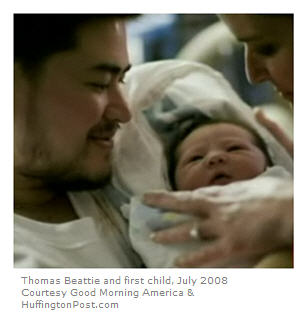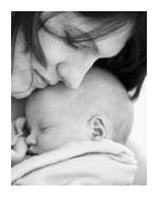So what’s up with the pregnant man?
Frankly, I’m a little tired of opening my email lately, and getting a feed that includes mention of “pregnant man expecting third child.”
 When I first saw that headline (how could it not catch your eye?), I believe it was via the Huffington Post. I couldn’t help myself. I clicked over and read.
When I first saw that headline (how could it not catch your eye?), I believe it was via the Huffington Post. I couldn’t help myself. I clicked over and read.
Interesting. A 30-something transgender male who had decided to keep his female reproductive system (in the hope of having a child someday), was announcing his third pregnancy.
He was married, had been impregnated through artificial insemination, and given birth to a healthy baby in 2008 and again in 2009.
Musing? Amusing? Confusing?
I’ve always been of a mindset that what individuals (of either gender) do with their bodies is their own business, and what they do behind closed doors with those they love, equally so. I cannot imagine my “self” without my female identity. I cannot imagine what it must be like to feel born into a body that doesn’t match to the person inside, the person you feel yourself to be. Living through uncertain issues of gender identity must be extraordinarily painful, and for those who don’t “fit,” a very private source of struggle.
I cannot imagine the weight of a decision to surgically alter one’s body to bring the interior and exterior into greater harmony, and then the courage to act on that decision.
What makes a man “manly”
 I’ve been thinking a great deal lately about the qualities in a man that I find “manly.” I’ve been thinking about what makes for a strong individual, yet not necessarily a strong man. Certainly, that’s an issue that is tied up in gender identification – but much more so in what society deems to be masculine. Or for that matter, feminine. It’s something I’d like to write more about, and explore.
I’ve been thinking a great deal lately about the qualities in a man that I find “manly.” I’ve been thinking about what makes for a strong individual, yet not necessarily a strong man. Certainly, that’s an issue that is tied up in gender identification – but much more so in what society deems to be masculine. Or for that matter, feminine. It’s something I’d like to write more about, and explore.
I have known men who are strong individuals, but whom I don’t consider strong men. It is a personal judgment, based upon criteria that are equally personal. Of course bedroom attitude has something to do with it, along with culturally rejected or accepted behaviors. And I like a strong man. In the ways that I identify masculine “strength” which are, admittedly, subjective and my own.
Incidentally, I also like strong women. I like strong individuals, those who know their own mind, which has nothing to do with vulnerability (or its absence), and everything to do with character.
 If I had to describe explicitly what I consider “manly” it might surprise you. It might not. It isn’t a fixed set of criteria; it is a way of interacting with the world – and with me – that I sense, that I experience, or I do not. My “manly” will not be your “manly,” and I wouldn’t expect otherwise, and I will add that it has little to do with physical attributes of any sort, though I certainly appreciate the beauty of the male form.
If I had to describe explicitly what I consider “manly” it might surprise you. It might not. It isn’t a fixed set of criteria; it is a way of interacting with the world – and with me – that I sense, that I experience, or I do not. My “manly” will not be your “manly,” and I wouldn’t expect otherwise, and I will add that it has little to do with physical attributes of any sort, though I certainly appreciate the beauty of the male form.
My “manly” has everything to do with the masculinity that the gentleman owns.
What makes a woman “womanly”
Likewise, I have my own standards for what is womanly, which is slightly different from what is feminine, though they overlap. Womanly, nonetheless, implies a certain fullness, a maturity that goes beyond femininity. I like to think it encompasses femininity and yes, I believe I am a strong woman, but also feminine, and womanly. Other women may or may not think so. Individual men may or may not think so. What could be more subjective than any of this?
Certainly, what makes me feminine or womanly has to do with both demeanor (external) and sensibilities (internal), and the way I interact with a man – in the bedroom, but also beyond it. Manliness and womanliness are not solely sexual, to my mind.
Men, women, and finding each other
Yesterday we opened up a discussion relative to men and women in the dating pool, to what men really think of women (and to some degree, vice versa). Individual experience shapes much of what we seek, particularly as we begin to mature. With a few miles comes a more finely honed understanding of what we find attractive and essential, the ingredients for a relationship with staying power, and what strikes us as workable in our lives. 
Let’s be real. We’re all a little confused about expectations. I’ve met men who find contemporary women to be too “strong” or aggressive, men who shy away from a woman who is too intelligent or too clear in what she knows about herself. I’ve met women who operate by checklist in their willingness to even get to know a man, to get beyond the first layers of self-protection, of social performance. We had no consensus on roles (or even who picks up the tab for dinner) in yesterday’s discussion; I wasn’t expecting one, and it wasn’t a representative sample.
Intimacy between a man and a woman? Getting there seems like a series of tests and hoops to jump through, not to mention the obstacles of an overwhelmingly pressurized and task-laden society that makes meeting each other difficult, much less more. How many of us ever get to a place of true intimacy with a partner? Emotional or otherwise?
When we add to the mix men who give birth to babies, arguments over biological gender versus legal, do we have media hype for headlines, or a genuine reflection of a culture in which gender confusion has replaced sexual fusion?
Families in all their variations
 I believe the desire for family is natural – whether on the part of a single woman, a gay couple, or in this case, a couple in which one of the partners is transgender. I believe men are capable of being as bonded and invested in their children as women. Keep in mind, Mr. Beattie’s wife is older and has children already. She can no longer conceive. And yet he, beginning the changeover process (apparently) at age 24, reportedly hoped to have children in the future.
I believe the desire for family is natural – whether on the part of a single woman, a gay couple, or in this case, a couple in which one of the partners is transgender. I believe men are capable of being as bonded and invested in their children as women. Keep in mind, Mr. Beattie’s wife is older and has children already. She can no longer conceive. And yet he, beginning the changeover process (apparently) at age 24, reportedly hoped to have children in the future.
I also wanted children in my thirties, but made a personal choice to not become a single parent at a time when I knew other single women who were choosing insemination and parenthood on their own. Ironically, I have been largely a solo mother, despite having married and then bearing children.
That said, what Thomas Beattie and his wife choose to do as a family is their business, in my view. And yet I admit to understanding some of the controversy on this one. Perhaps some of it has to do with the fact that this is the couple’s third child. Perhaps it has to do with reading something about Mr. Beattie showing off a post-pregnancy belly at one point, proud to have no stretch marks, and this wreaks of exactly the narrow space in which women are expected to exist – seductress, homemaker, breadwinner, mother – all without so much as a trace of the wear-and-tear on the flesh, but this time with the assistance of a hormonally transformed body.
In a gender-confused culture, is this having it all?
Comfortable in one’s skin
I feel conflicted (and a bit petty) even asking such a question. Surely Thomas Beattie spent much of his adulthood dealing with internal turmoil I cannot even begin to imagine. I understand wanting children, and the bond between a parent and child is like a color on the spectrum that is inexpressibly brilliant which, if you are color-blind, you cannot see, and cannot conceive. I believe that parenthood is a privilege – not a right, and not to be taken lightly. 
But as a woman, I also know what it is to live in a man’s world, to accept a hundred compromises and inequities – tiny and not so tiny – in exchange for the pleasure and special magic of being female. As for the magic, it is at least in part in our ability to reproduce. To grow life, to carry life, to have a bond that is ferociously and tenderly visceral.
I know the pain that friends have faced when fertility issues have arisen. I know the pain of miscarriage. I know what it is to want more children, and have a spouse say no. I know what it is to respect that “no,” as I believe that marriage should be about mutual decisions in this arena. I know what it is to live with regrets. To live, essentially, with little to no family.
I believe in family in all its configurations. Yet oddly, this third child in three years time is news that is vaguely disturbing to me. I wish the Beatties well – and I wish them a healthy addition to their thriving household. I also wish that the news media would keep their noses out of these things which are, ultimately, private matters. Or are they?
At what point do we so blur the boundaries of sexual identification as to find ourselves utterly confused? Or does it not matter a damn, if we are good to each other and good to our children?
What a thoughtful, meticulous, articulate post. And one that has left me with inspiration to do some more thinking about the power of labels.
In this case, how would I react if I removed the labels and stuck with the facts – a couple having their third child in three years? I would probably think: “Whoa, good luck! Two in two is giving me a run for my money!” or “That’s a lot of money in Pampers’ pocket!”
So what do the labels do for us? Do they complicate the situation? Should they?
Such good food for thought.
This line jumped out at me: But as a woman, I also know what it is to live in a man’s world, to accept a hundred compromises and inequities – tiny and not so tiny – in exchange for the pleasure and special magic of being female.
As a single dad who works from home, I know what it’s like to live in a woman’s world! Volunteering at the school (mostly moms), grocery shopping (mostly moms), organizing get-togethers with other families (mostly moms do this). Rather than be handed compromises, I’m sometimes discriminated against, and often cut out completely.
As for the special magic of being a man? Um… huh. 🙂 (I like being a man, but we don’t get any special magic.)
btw – the pregnant man is going too far, in my opinion.
Hi there! I finally got around to these parts of the web long enough to read this tremendous, eloquent and provocative post and leave a comment.
What I’m getting from your post is that the reality of Beattie’s and his family’s life is really not that out of the ordinary if we take away his extraordinary gender. Like the rest of us, he’s human with all the trappings of a human’s needs/desires/idiosyncracies who’s making the most of his existence. So, I share the sentiment you convey in your second to the last paragraph: I wish the news media would act responsibly and do some serious investigating — in, say, the real dirt on factory farms and how it’s related to obesity and other diet-related issues that are slowly and surely killing us and our planet — instead of obsessing over a little family about to have their third child.
Thanks for this and for visiting and commenting on my blog recently.
The older I get, the less I care about how people live their lives behind closed doors. And I wish the media would follow suit.
I know amazing women who are committed to each other and raising children. I know women who started out with women, are now with men, and that’s fine with me. My uncle was gay and was a tremendously kind, gentle soul.
Personally, I’m with you–I see that family having 3 kids in as many years and I think–Yowwwza! But maybe they like the chaos. Maybe they can handle the roller coaster–I can’t–but who am I to say?
I think parenting is sort of analogous to college exam-taking… There are people who start studying weeks before the exam (c’est moi) and there are people who cram and stay up nights and thrive on the stress, the adrenaline (hubs). And you know? Whatever works, right? We both did fine, but had completely different operating instructions.
Great post, as always. You always get my brain a-churnin’.
Perhaps if one had just arrived here from another corner of the cosmos and were confronted with an androgynous pregnant human one would simply roll with it. It’s the WAY humans generally treat each other that might be harder to endorse.
This was a great jumping off point for your exploration of sex roles and gender. Some day perhaps we’ll all be a little more Bowie…
Such an interesting and provocative post. To me, this story is rooted in our anxiety about otherness. This story falls so far outside the periphery of what many consider “normal” or “natural” that I don’t think people truly know what to make of it. Hence, confusion. Controversy. Contempt.
Thank you for asking the hard questions and making us all think.
Sorry I’m so late on this one, BLW, but here’s my take on it. I think that the world (or at least the world I like to think I live in) got comfortable with transgender issues, with accepting that sometimes people feel they are born the wrong sex and correcting it. So it’s expected that they would change their sex – all the way. Kind of saying goodbye to their old sex. After all, if the person felt they were born into the wrong sex, they would leave that behind, right? And though we all know there’s some transition time to that, we wouldn’t expect someone to straddle the genders intentionally. To me, that seems to be what has confounded people in this particular case.